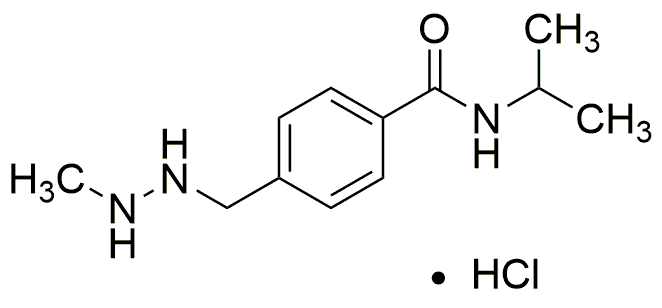Procarbazine hydrochloride is widely utilized in research focused on
- Cancer Treatment: Primarily used as a chemotherapy agent, it is effective in treating certain types of cancers, particularly Hodgkin's lymphoma. Its ability to inhibit cell division makes it a crucial part of combination therapy regimens.
- Research in Oncology: Researchers often use this compound in clinical trials to study its efficacy and safety in various cancer treatments, helping to develop new therapeutic strategies.
- Pharmaceutical Development: It serves as a model compound in the development of new anti-cancer drugs, allowing scientists to explore modifications that enhance effectiveness or reduce side effects.
- Mechanistic Studies: Procarbazine hydrochloride is utilized in laboratory settings to understand the biochemical pathways involved in cancer cell proliferation and resistance, providing insights for future therapies.
- Combination Therapies: Its use in conjunction with other chemotherapeutic agents is studied to improve treatment outcomes, making it a valuable tool in developing multi-drug regimens.
Informations générales
Propriétés
Sécurité et réglementation
Applications
Procarbazine hydrochloride is widely utilized in research focused on
- Cancer Treatment: Primarily used as a chemotherapy agent, it is effective in treating certain types of cancers, particularly Hodgkin's lymphoma. Its ability to inhibit cell division makes it a crucial part of combination therapy regimens.
- Research in Oncology: Researchers often use this compound in clinical trials to study its efficacy and safety in various cancer treatments, helping to develop new therapeutic strategies.
- Pharmaceutical Development: It serves as a model compound in the development of new anti-cancer drugs, allowing scientists to explore modifications that enhance effectiveness or reduce side effects.
- Mechanistic Studies: Procarbazine hydrochloride is utilized in laboratory settings to understand the biochemical pathways involved in cancer cell proliferation and resistance, providing insights for future therapies.
- Combination Therapies: Its use in conjunction with other chemotherapeutic agents is studied to improve treatment outcomes, making it a valuable tool in developing multi-drug regimens.
Documents
Fiches de données de sécurité (FDS)
La FDS fournit des informations de sécurité complètes sur la manipulation, le stockage et l’élimination du produit.
Spécifications du produit (PS)
Le PS fournit une description complète des propriétés du produit, notamment sa composition chimique, son état physique, sa pureté et les exigences de stockage. Il détaille également les plages de qualité acceptables et les applications prévues du produit.
Certificats d'analyse (COA)
Recherchez des certificats d'analyse (COA) en saisissant le numéro de lot du produit. Les numéros de lot et de lot se trouvent sur l'étiquette d'un produit, après les mots « Lot » ou « Lot de fabrication ».
Numéro de catalogue
Numéro de lot/série
Certificats d'origine (COO)
Ce certificat d'exploitation confirme le pays dans lequel le produit a été fabriqué, et détaille également les matériaux et composants utilisés et s'il est issu de sources naturelles, synthétiques ou autres sources spécifiques. Ce certificat peut être requis pour les douanes, le commerce et la conformité réglementaire.
Numéro de catalogue
Numéro de lot/série
Fiches de données de sécurité (FDS)
La FDS fournit des informations de sécurité complètes sur la manipulation, le stockage et l’élimination du produit.
DownloadSpécifications du produit (PS)
Le PS fournit une description complète des propriétés du produit, notamment sa composition chimique, son état physique, sa pureté et les exigences de stockage. Il détaille également les plages de qualité acceptables et les applications prévues du produit.
DownloadCertificats d'analyse (COA)
Recherchez des certificats d'analyse (COA) en saisissant le numéro de lot du produit. Les numéros de lot et de lot se trouvent sur l'étiquette d'un produit, après les mots « Lot » ou « Lot de fabrication ».
Numéro de catalogue
Numéro de lot/série
Certificats d'origine (COO)
Ce certificat d'exploitation confirme le pays dans lequel le produit a été fabriqué, et détaille également les matériaux et composants utilisés et s'il est issu de sources naturelles, synthétiques ou autres sources spécifiques. Ce certificat peut être requis pour les douanes, le commerce et la conformité réglementaire.


